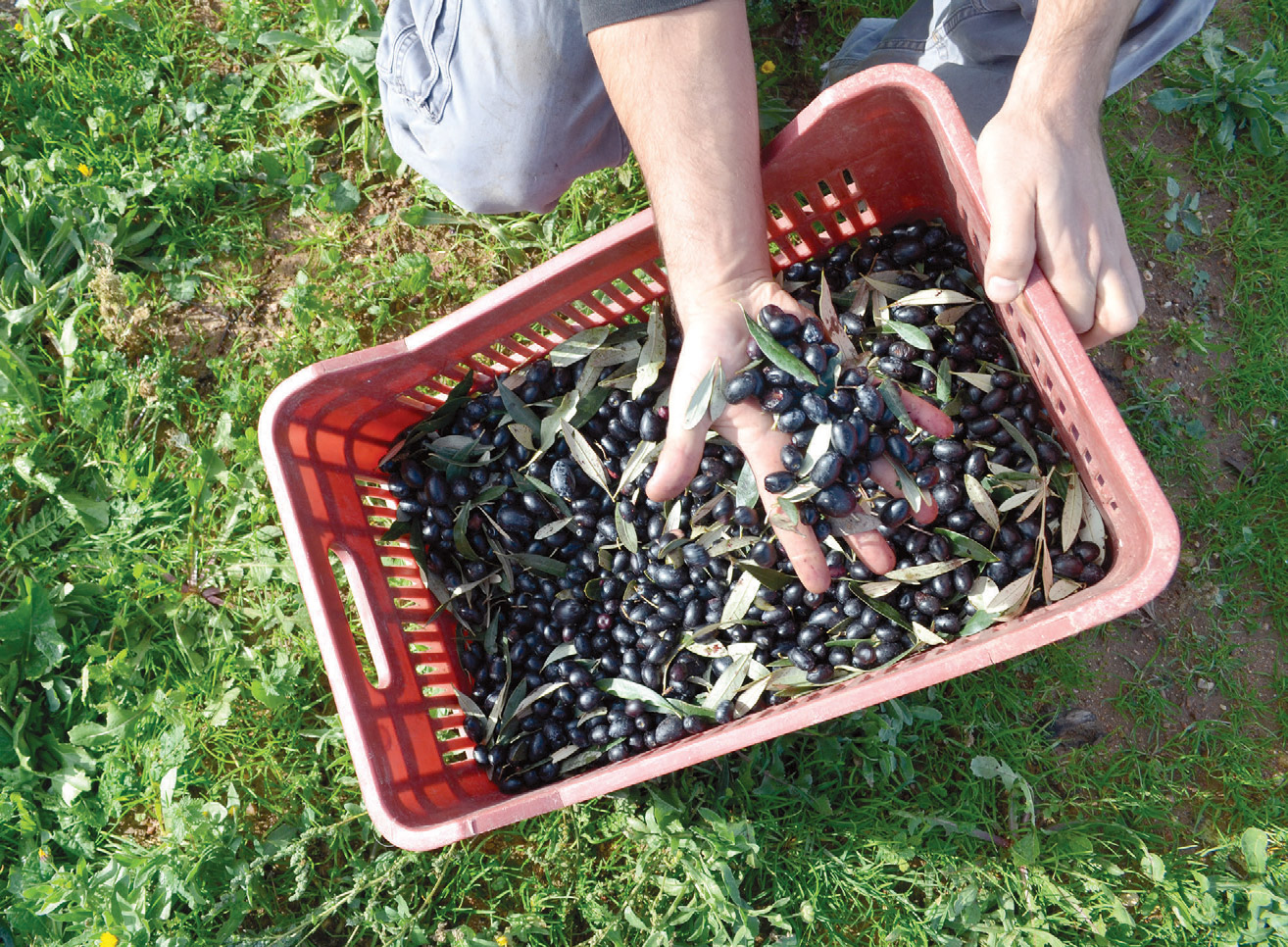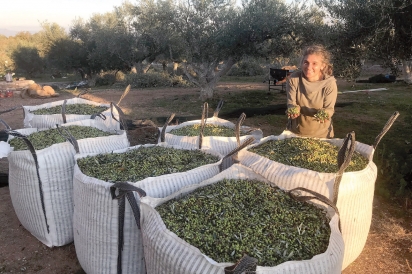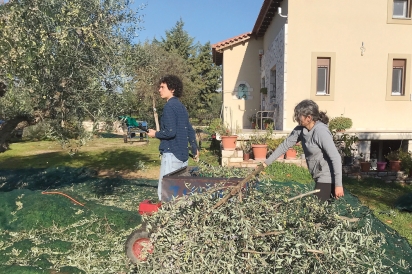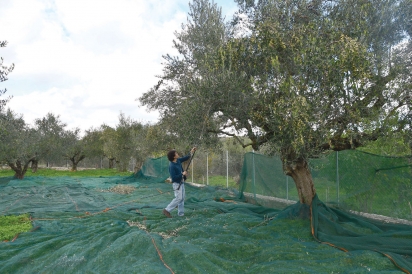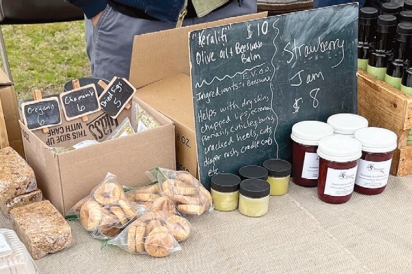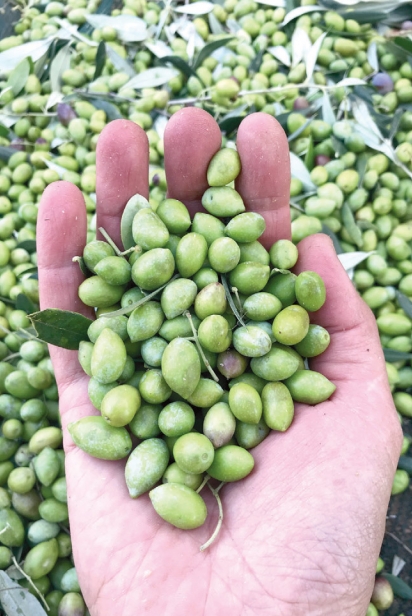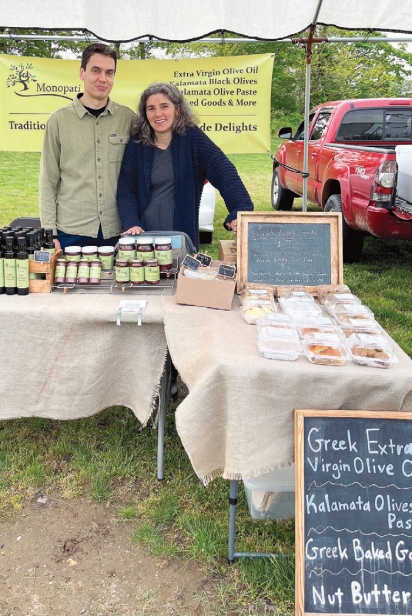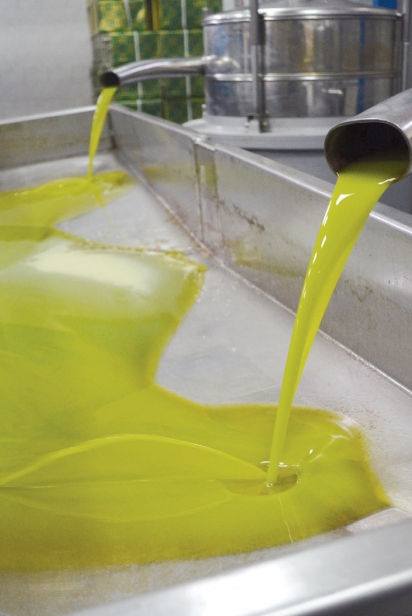A Taste of Greece: Monopati Farms
Can’t get to Greece this summer? Maria Lemanis and Georgios Tselepis will bring Greece to you. 2022 marks the tenth summer they’ll be at farmers’ markets Cape-wide with olives, extra virgin olive oil and dried figs from their family’s farm in Greece, plus an array of specialties, both savory and sweet, that they bake daily.
Translated to mean “path,” Monopati, the name of their farm, underscores the trail they’ve blazed, one of the longest work commutes ever. Beginning every fall, for six months this married pair resides in Pelekanada, a tiny Greek village, where Maria Lemanis’s mother, grandmother and cousins live. This couple joins her family’s agriculture operation to harvest olives both for eating and to be pressed for oil, and to gather figs to sell fresh and for drying. In early spring they return to Dennis, just before the cartons and cartons of extra virgin olive oil, table olives and figs that they will sell on Cape Cod arrive in Boston by cargo ship.
On Google Earth, Pelekanada appears as a patchwork of fields. “In Greece,” Lemanis explains, “Land titles often pass on via the woman’s family. Some of the thousands of fig and olive trees here were given to my grandparents by their grandparents. Our land totals about 40 acres, yet it’s not all in one place, rather it dots the hills and countryside, intermingled with other landowners’ plots. Everyone in the village knows exactly whose trees are whose.”
Currently about 200 residents live there in just a few dozen homes. “There’s not a single store.” Lemanis states. “Places like schools are becoming more centralized, with each providing services to a larger geographical area. Many young people are moving out, wanting to experience city life. My uncle, though, chose to stay. He is the one that oversees our olive and fig fields, using much the same growing methods that we’ve had for decades.”
Globally, sustaining agriculture operations such as Monopati may become more attractive to continue not only gastronomically, but for the environment. Studies find an olive tree’s ability to sequester carbon in the soil exceeds the amount of carbon produced in the oil extraction process, making it an effective carbon sink. Next in line to manage the family’s fields is Maria Lemanis’s cousin, and so far he seems inclined to do so. “He’s of the younger generation and impassioned about earning our farm’s products the designation of ‘bio’ that will then go on our label. It’s the equivalent of certified organic in the United States,” explains Lemanis.
Of the botanical family Olea, olives are related to forsythia, jasmine and lilacs. Olea europaea (European olive), the species that produces the fruit we consume, contains dozens of unique varieties enjoyed in different cuisines around the world. The trees themselves are amazingly resilient; some are often well over a century in production. The olive that we eat is the fruit of the tree and the pit within it is the seed of that fruit.
An olive is a powerhouse of nutrients; rich in bioflavonoids, vitamin E and K, and good cholesterol. Like dark chocolate, red wine and berries, olives are rich in polyphenols, a type of plant compound that has antioxidant and anti-inflammatory properties. Olive oil is the basis of the Mediterranean diet touted by many as one of the healthiest in the world and thought to be effective towards weight control and heart health, as well as skin and hair nutrition. The density of nutrients of olives ensures that if one fell and remained on the ground, the pit within it would have enough nourishment from the flesh surrounding it to likely develop into a strong seedling.
Usually in early October, Monopati Farm’s olives are mature and ready to be harvested. Whomever is close by and able to help arrives for whatever time they can schedule. The family comes together with cousins and aunts and brothers and grandparents working collectively to supply the labor they would otherwise have to hire. Together they pick about 11 tons of olives, reserving about 1.5 tons for family use, and selling the balance. Figs are harvested too, some for eating fresh, and others spread and kept on netting in vented greenhouses until they’re dry.
While growing methods have remained essentially the same, automated equipment has eased both the gathering of the fruit and olive oil production. Large mesh tarps are spread in carpet-like fashion beneath the trees bearing mature fruit. Smaller, lower fruit-laden stems are pruned out manually and run through a piece of equipment with an automated rotating drum that knocks the olives off the branches. To reach the highest limbs, the tallest and stronger harvesters hold extension poles that have a mechanized long fingered claw on its end that combs out the olives, dropping them to the ground. “That’s something that I do,” says Georgios Tselepis, grinning. “It’s tough on the upper arms.”
After each area’s olive harvest is raked, sorted free of leaves and sticks, and bagged up, the process repeats under the next adjacent group of trees. A bulldozer piled high with the massive sacks carts the bags to the town’s press. Most villages have their own processing plant, and theirs is not a co-op. They prefer this state of things, as this ensures that the oil they receive is precisely the oil extracted only from the olives they have grown and harvested.
Monopati’s oil earns the extra virgin label because it is produced by cold pressing; no heat or chemical methods are used. In addition, the acid percentage needs to remain low to maintain this extra-virgin designation. Recent focus, including reports by 60 Minutes and NPR, and the book Extra Virginity, by Tom Mueller, have revealed the great disparity in olive oil quality on supermarket shelves worldwide. Falsely labelled, some oils have been heat processed, have chemical additives, are blended with substandard quality oils, or do not contain any olive oil at all; an imposter oil that’s been altered chemically to look and taste like olive oil.
“The very first pressing is when the oil has the most distinct flavor and deepest bright green hue due to its high chlorophyll content. As the oil ages, its taste becomes more mild and buttery, and its color lightens,” says Georgios Tselepis. “The oil extracted within the first three weeks of harvest can be an acquired taste; very little if any of it even gets exported. Some people may not care for the initial pressing yet it has the most health benefits, the most polyphenols.”
Heat, oxygen and light are highly detrimental to the flavor and nutrients of olive oil, and so must be considered throughout production, bottling, shipping, and storage. Some facilities pump their large metal olive oil storage tanks with nitrogen as the oil levels drop, to avoid the affects that oxygen would have on the oil. Choosing bottles in the darkest colored glass helps to protect the oil from light’s detrimental effects, too.
In their sunny Dennis kitchen, a bottle of Monopati oil rests on the counter. Nearby, gleaming shelves are stacked with the pans they’ll use for baking. Assorted appliances await to blend olive oil nut butters in hazelnut, almond and peanut varieties.
On the pristine wooden island in the center of the room, Georgios Tselepis prepares to create his spanakopita, or spinach pie; layers of crisp dough surrounding a spinach filling, one of the classics on their menu. He rolls a long, one-inch diameter wooden dowel across a flattened round of pale dough. Deftly applying pressure, the sheets of dough grow larger and larger. Tselepis says “I use this instead of a traditional rolling pin to get my dough much wider.”
Tenderly he places the thin dough into a sparkling silver pan, its sides higher than most baking trays, perhaps three inches tall, to contain all the layers of filling he’ll add. He paints the expanse of each layer of dough with their family’s extra virgin olive oil. Every time he rolls, he powders the wooden roller and the tabletop with cornstarch. “It’s the secret touch; cornstarch makes for a much crisper dough than flour, which gets absorbed into your baked goods,” says Tselepis.
The filling Tselepis spoons on is a mixture of spinach, onion, salt and pepper, and his signature touch of a few minced leeks to add sweetness. Then he tops it with egg stirred into a generous amount of feta. Two more layers of dough brushed with olive oil and the dish is popped into a convection oven at high heat. About 45 minutes later, heaven awaits as one waves the steam from the fragrant pastry to nibble the goodness inside.
“We watched very carefully our first year selling. We observed a need for good food; people were hungry at the markets,” smiles Maria Lemanis. “That was our niche — this spinach pie is the first dish we added. We prepare things together but I cook because I love to eat; Georgios cooks for the joy of the whole process.”
Soon trays of baklava and spanakopita are rubbing elbows with rows of olive oil. Orange butter cookies (koulourakia), powdered sugar cookies (kourabiedes), honey syrup cookies (melomakarona), and savory olive cookies are next. Now specials are rotated in, too, like nut butters, olive oil cake and peanut butter nut bars. There’s jarred table olives dredged in oil and dried figs. Even olive oil beeswax balm. “We have high quality products and a consistency from year to year,” Lemanis says. “Once people taste them and get to know us, they return again and again. Our customers are very loyal.”
With their lives now split equally between one peninsula jutting into the Mediterranean and another extending into Cape Cod Bay, their journey actually began in big city Athens. “We met each other working at the Hard Rock Cafe in 2006 during college studies,” grins Tselepis.
Georgios Tselepis was born and raised in Athens, Greece, but Maria Lemanis was actually raised in Sandwich, MA. Her parents came to Boston for their educations and continued working in the states. Maria returned to Greece with them in 2005. Later, when hard times rocked the Greek economy, Lemanis and Tselepis, who by then were married, brainstormed options to increase their earning power.
Launching their vision in 2013 selling only a single product, extra virgin olive oil, it was initially tough getting farmers’ markets to welcome them. Yet with persistence, markets from Falmouth to Ptown have supported their high-quality agricultural products that, although imported, are lovingly produced by part-year Cape residents. Their concept, Monopati Farms, has proven to be not only a winning one, but one they’re passionate about continuing and fine-tuning.
Yet years of unloading their wares and setting up for markets and then packing up and hauling supplies back home seven times weekly has been a challenge. Plus, although baked fresh each morning, their specialties arrive to market at best only faintly warm. Serving them piping hot to customers is their goal.
“We’d like to offer specialties needing refrigeration too,” says Tselepis. “Lovely feta, a wide array of cheese and really wonderful Greek yogurts.”
In the not-too-distant future, the couple hopes for a brick and mortar site. “We’ve taken this model about as far as we can. A location with a modest commercial kitchen; a place that’s our own,” says Lemanis as they break into smiles. “We’d love that.”
Monopatifarms.com
monopatifarms@gmail.com
2022 Farmers Markets: Chatham, Falmouth, Orleans,
Osterville, Sandwich, Truro and Wellfleet.


